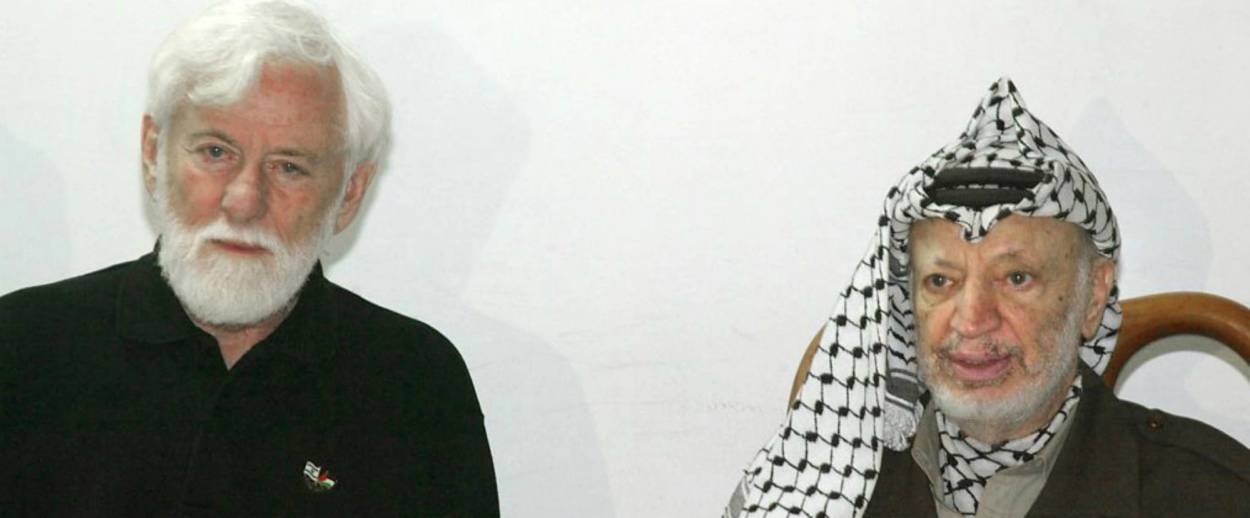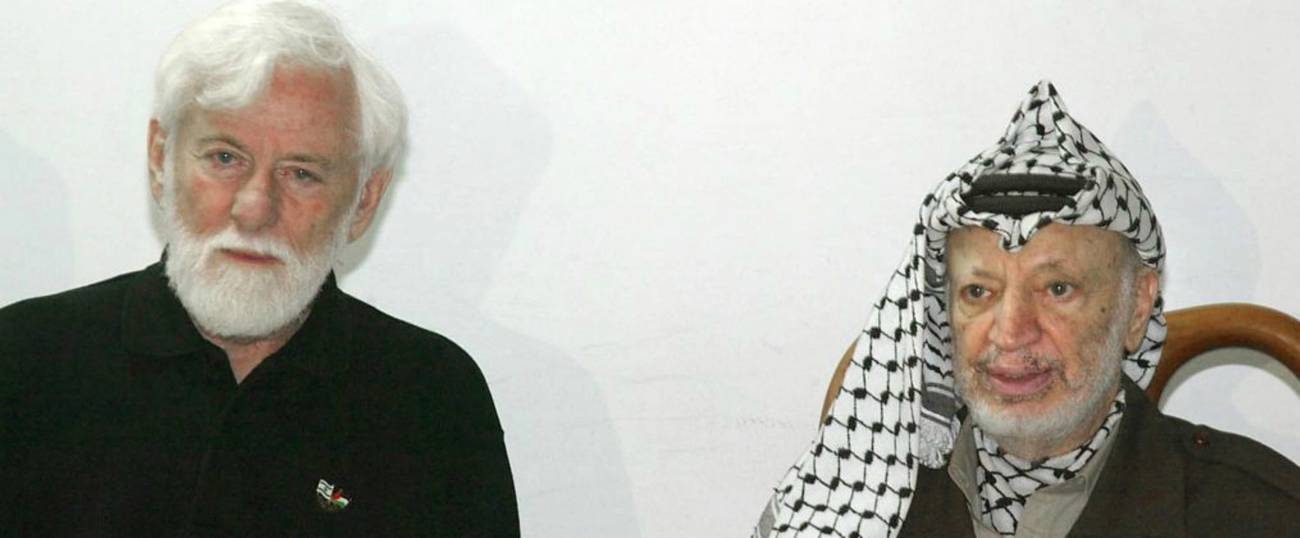Farewell to Uri Avnery, Israel’s Radical Warrior for Peace
The prominent leftist spoke clearly and unequivocally, and his courage won him the respect of even his bitterest ideological foes.




Uri Avnery wasn’t what you’d expect him to be. When I first met him, I was a young peace activist, and I approached him, the Grand Old Man of the Israeli peace camp, with a mix of trepidation and admiration. I reiterated my commitment to the cause, and I expected the warmth and encouragement that his white beard and hair seemed to suggest. Instead, Avnery looked at me coldly. I forgot what he said, but the gist of it was that I shouldn’t expect any rewards or congratulations for doing what I thought was the right thing. The message stuck.
I’ve since evolved, politically, and no longer share Avenry’s hard-left ideology, but, like many of his former friends and adversaries, I’ve never lost my respect for him. That’s because Avnery, who passed away earlier this week at 94, was a warrior, uncompromising and undeterred, refusing to abandon hope even as all of observable reality suggested otherwise.
He was born in Westphalia, and when he was 10, the family fled Hitler and left its fortune behind. They made it to Palestine, where Avnery, precocious but broke, had to quit school and support himself by working a string of odd jobs. He educated himself by reading books, but by the time he turned 15, he was seized by a different passion, the struggle to liberate the Jewish community from the yoke of the British Mandate. Avnery joined the Irgun, the more staunchly right-wing of the underground groups fighting for independence at the time. His talent for public speaking and writing was considerable, and even as a teenager, he quickly climbed the ranks and became one of the group’s most effective communicators.
But even in his new dogmatic milieu, his profoundly unorthodox character soon shone through. Unlike his peers, he was less interested in a Jewish state, seeing nationalism and religion alike as the offspring of “Europe’s weak-spined morals” and calling instead on a return to a belief in the Hebrew race, that ancient breed of biblical conquerors from which all Jews are descended. This made him one of the leaders of the Canaanite movement, a radical group of intellectuals who believed, among other things, that Arabs and Hebrews, two Semitic races, ought to band together and fight the colonialist European oppressors.
The War of Independence curtailed Avnery’s efforts, however, and he enlisted as a commando soldier fighting in the South. He participated in dozens of bloody battles, commanding some before being severely wounded and sent to a long recovery far from the front lines. While convalescing, he wrote In the Fields of Palestine, 1948, a wartime memoir that became the just-born nation’s first bestseller. Avnery wrote for Haaretz for a spell, but, in 1950, felt ready to embark on his own path.
Together with a friend, he purchased a struggling weekly magazine called Haolam Hazeh, or This World. Within months, Avnery transformed it into a fascinating publication, blending together borderline pornographic yellow journalism with hard-hitting muckraking unheard of in a country that still relied on a partisan, and largely uncritical, press. Among covers like “Confessions of a Nudist,” featuring a naked woman smiling at the camera, Avnery exposed Moshe Dayan’s secret affairs, government abuses of power, and other wrongdoings that would’ve remained concealed if it weren’t for his courage and his convictions. Protesting what he saw as Israel’s overreaching in kidnapping Adolf Eichmann and bringing him to justice in Jerusalem, he had his publication name the Nazi officer Haolam Hazeh‘s man of the year. The magazine disturbed the establishment so much that it was only ever referred to, in the press and in the Knesset, as “that certain weekly,” never by its name. For a few years in the 1960s, even the Mossad got involved, starting its own magazine, Rimon, in an effort to steal Haolam Hazeh‘s readership. The plot failed: Avnery was a true original, and his sensibilities impossible to replicate.
By the time the 1967 war left Israel in control of Judea, Samaria, and the Gaza Strip, Avnery found his true calling, and began campaigning tirelessly for the creation of a Palestinian state side-by-side with Israel. He was elected as a member of several Knessets, and became the first person in the parliament’s history to be dragged out forcefully, after he tore his identity card, protesting the government’s decision to list its citizens’ nationality in official state-issued documents. He was also a strong supporter of gay rights, a subject considered largely taboo at the time, and was one of the first politicians to point out the systemic discrimination against Israelis born in Arab and North African countries.
His crowning moment, however, came in 1982, when, a month after the launch of the Lebanon War, he made his way into besieged Beirut and met with the PLO’s leader, Yasser Arafat. Public opinion in Israel condemned Avnery as a traitor, but his interview with the arch-terrorist provided the first opportunity most Israelis ever had to listen to their worst enemy’s point of view. He held similarly thorny positions even after Arafat had become Israel’s partner in the Oslo Accord, protesting, for example, Yitzhak Rabin’s decision to deport 415 Hamas terrorists to Lebanon as well as Ariel Sharon’s decision to unilaterally withdraw from Gaza.
He had few followers, particularly as Arafat and his successor met Israel’s peaceful overtures with more violence and incitement, but Avnery never despaired. He was there at every public protest, his white hair and beard visible from afar, ready to speak out loudly and unsentimentally in support of his beliefs. And unlike his ideological children on the Israeli left, who too often speak in the garbled jargon of global tenured radicals, Avnery was never one for doublespeak, platitudes, or lies. He believed Israeli soldiers committed murders every time they clashed with Palestinians, even if the latter were armed terrorists. He believed in making friends with Hamas. He believed Israel alone bore all responsibility for the conflict, regardless of the tidal waves of terrorism unleashed by his friend Arafat. And he was unapologetic about these beliefs, never bothering to mask them in slick-sounding rhetoric. It’s the sort of intellectual and moral integrity that’s sorely missing in his camp these days, and that will continue to guarantee that even those of us who found his ideas reprehensible never stopped applauding his courage.
Liel Leibovitz is editor-at-large for Tablet Magazine and a host of its weekly culture podcast Unorthodox and daily Talmud podcast Take One. He is the editor of Zionism: The Tablet Guide.